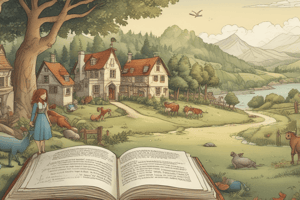Podcast
Questions and Answers
What is the definition of dialogue?
What is the definition of dialogue?
- A form of stage direction
- A remark intended for the audience
- A conversation between two or more people (correct)
- A character's inner thoughts
An aside is a remark intended only for the audience.
An aside is a remark intended only for the audience.
True (A)
What is a soliloquy?
What is a soliloquy?
A monologue spoken by a character when they are alone.
A conversation between characters in a book is called ___.
A conversation between characters in a book is called ___.
Match the term with its definition:
Match the term with its definition:
Flashcards are hidden until you start studying
Study Notes
Dialogue
- Defined as a conversation between two or more people in literature, often indicated by quotation marks.
- Examples include characters discussing personal revelations or plans, such as:
- In the Year of Wonders: Anna confronts Mompellion about his relationship with Elinor.
- The Hunger Games: Cinna advises Katniss on how to approach her interview.
- Pop culture reference: Titanic, where Jack urges Rose to survive amidst a crisis.
Aside
- A remark intended for the audience while other characters on stage remain unaware, typically involves self-reflection.
- Examples showcase inner thoughts at critical moments:
- Romeo and Juliet: Romeo’s aside during Juliet's balcony monologue reveals his uncertainty.
- Julius Caesar: Brutus expresses his sorrow about betraying Caesar in an aside before the assassination.
- Pop culture reference: Malcolm in the Middle, where Malcolm directly addresses the audience through asides in episodes.
Soliloquy
- A monologue delivered by a character alone, revealing innermost thoughts and emotions.
- Critical for understanding character motives and feelings through self-reflection:
- A Midsummer Night's Dream: Helena reflects on her perceived lack of beauty and unrequited love for Demetrius.
- The Merchant of Venice: Shylock confronts his mistreatment as a Jew, articulating his shared humanity.
- Pop culture reference: Les Miserables, where Jean Valjean’s song conveys his internal struggle and desire for change.
Studying That Suits You
Use AI to generate personalized quizzes and flashcards to suit your learning preferences.




